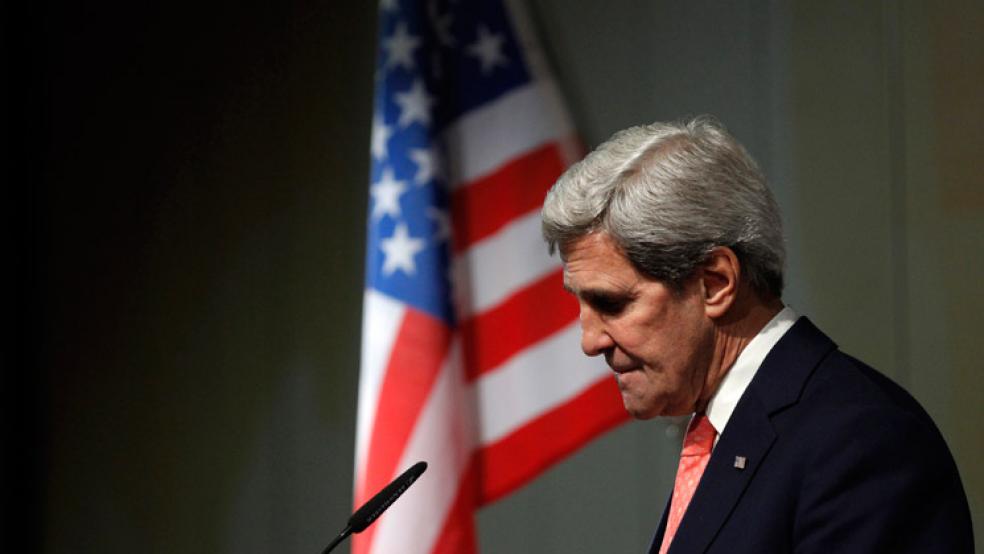As the civil war in Syria raged last July and as Egypt descended into chaos following a coup, Secretary of State John Kerry made an unexpected announcement: The United States was backing a new round of peace talks between Israel and Palestine.
Given events elsewhere in the Middle East, the out-of-the-blue announcement came as a shock. American influence across the region was waning, and the talks were largely seen as a last-ditch effort for the United States to remain relevant there.
Related: Obama’s Last-Ditch Effort for Middle East Relevance
Even Kerry acknowledged that both sides faced an uphill task, but expressed optimism that negotiations, which had been stalled for three years, could yield positive results.
“It’s no secret that this is a difficult process,” he said at the time. “If it were easy, it would have happened a long time ago. It’s no secret, therefore, that many difficult choices lie ahead for the negotiators and for the leaders as we seek reasonable compromises on tough, complicated, emotional and symbolic issues.
“I think reasonable compromises have to be a keystone of all of this effort,” Kerry added. “I know the negotiations are going to be tough, but I also know that the consequences of not trying could be worse.”
Now, eight months later, all sides have acknowledged that the talks are on the verge of falling apart. There’s little hope that a deal would be made by the end of the month, as Kerry envisioned.
Related: Three U.S. Diplomatic Failures Could Make a Trend
Last week, the Israeli government canceled a fourth prisoner release, a gesture that had been the foundation of the talks. This followed a declaration by the Palestinian leadership that they would try to seek additional recognition from the United Nations, which led to accusations and counter accusations.
Israeli Justice Minister Tzipi Livni said Palestine had violated the terms of the deal, while Palestinian leader Mahmoud Abbas countered that Israel was breaking its promise to release the prisoners.
Kerry on Friday said it was “reality check time,” and that the United States’ commitment to the talks was not open-ended. He said the State Department would “evaluate very carefully exactly where this is and where it might possibly be able to go."
Now, critics of the Obama administration’s approach are accusing Kerry of overreaching. If this was a ploy for the United States to reassert itself in the region, it’s failed.
Related: Kerry Just Took the Teeth Out of the Syria Deal
“This was an obvious loser from the beginning. Even if he wanted to, Abbas couldn’t provide Israel with the real security assurances it would need since he couldn’t speak for Hamas-run Gaza,” said Christian Whiton, a former Bush administration State Department senior advisor.
Missteps Along the Way
The talks appear to have been doomed from the start. Since they began last summer, the process has been marred by mutual distrust and diplomatic gaffes, including a key one by Kerry.
Last November, Palestinian negotiators walked away when Israel said there would not be a state based on 1967 borders, referring to a period when Israel was smaller. Then, in January, Israel announced plans for 1,400 settler homes in Palestine, prompting Palestinian negotiator Saeb Erekat to say, “The recent announcement shows Israel’s clear commitment to the destruction of peace efforts and the imposition of an apartheid regime.”
Perhaps Kerry committed the most harmful gaffe. In Munich earlier this year, he suggested that public opinion of Israel could decline if the talks don’t succeed. “No pressure will force me to give up the vital interests of the state of Israel, above all the security of the citizens of Israel,” Israeli Prime Minister Benjamin Netanyahu countered. The State Department then accused Israel of distorting what Kerry said.
The ugly exchange between allies has been indicative of the tone of talks from the start. Whiton said Kerry’s arrogance also undermined the process.
“It was always fanciful that John Kerry was going to find the magical combination of words and succeed where successive administrations have failed. A big part of this was browbeating our ally into submission, which didn’t fly with the Netanyahu government,” Whiton said. “The Israelis and our other Middle Eastern allies are now well apprised of Obama’s mistreatment of them and romancing of their opponents. They have little incentive to cooperate.”
The Two State Solution
It now appears as if these talks, like those before it, are likely to fail. Former Ambassador Dennis Ross, the William Davidson Distinguished Fellow and counselor at The Washington Institute, said that the issue could only be solved with the creation of two states.
“Some advocate a one-state alternative, but there is not a single place in the Middle East where two separate national identities live in peace within the same state,” Ross said in Washington last week. “The only answer is two states for two peoples. At the end of the day, the parties must find a way back to this.”
However, Whiton said the White House has been ignoring the true issue that’s driving Israeli concerns: Iran. He said until Israeli concerns about Tehran’s intentions are addressed, the process is likely doomed.
“The 800-pound gorilla in the room is Iran, which has two proxy armies on Israel’s borders and will prevent any deal unlikely to result in Israel’s destruction,” he said.
“We need to get away from the myth that solving the Israeli-Palestinian dispute is the key to Middle Eastern peace. There is something much bigger going on in the region and Iran is behind most of the worst of it,” Whiton added. “Solving Iran—essentially by helping its people free themselves—is what will solve many of these disputes, including the Israeli-Palestinian one. Not the other way around.”
Top Reads from The Fiscal Times:
- Four Ideas to Help Revive the Middle Class
- Liberal Dems’ New Goal: Boost Social Security Benefits
- Obama’s Overtime ‘Order’ Gets an Overreaction





